Nigel Westlake talks to
The Northampton Herald about Miss Potter
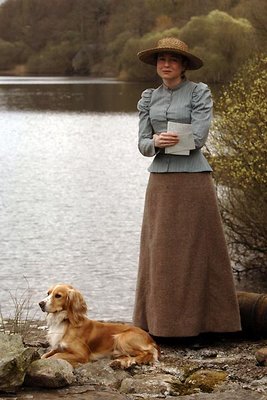
|
Did you read or re-read any of the stories written by Beatrix Potter to conjure up the style of music you thought you might need for the film?
I read as much material on Beatrix Potter as I could find, including her stories, her diaries (transcribed from her secret code) & several biographies. Did you see any of the film before you wrote the musical tracks to see the pace and get an idea of what was required?
The main theme for the film ("Let me teach you how to dance") was composed long before I saw any footage. In fact, halfway through the shoot I had a call from director Chris Noonan on set, requesting me to compose a theme for the music box scene which was about to be filmed with Renee Zellweger & Ewan McGregor.
This is a very touching moment between Beatrix & her publisher Norman Warne.
Beatrix has painted a beautiful painting for Norman as a Christmas present & takes him up to her room to present the gift. He notices a music box in the corner of the room - this was given to Beatrix by her father when she was 9 years old. Norman opens the music box & it begins to play. He recognizes the melody & at Beatrix’s insistence, begins to sing "Let me teach you how to dance" (the lyrics were written by the writer of the screenplay Richard Maltby).
Beatrix becomes enchanted & together for a brief moment they dance a waltz to the accompaniment of the music box. Norman attempts to propose to Beatrix – but his clumsy attempts are rudely interrupted by Beatrix's overbearing & protective mother.
In describing the character of the melody to me, Chris Noonan said that he wanted the music box melody to suggest a popular song of the era (circa 1890)...a melody that was once well known, but has since been lost in time - that somehow reflects the innocence & gentility of the era.
This melody is used throughout the score as a reference to Beatrix's personal emotional story, in particular her relationship with her publisher Norman Warne. |
Did you visit The Lake District and see the areas where Beatrix Potter lived and wrote her stories?
In the early stages of writing I spent some time on lake Windermere & visited Hilltop farm in Near Sawrey with my wife Janice & Glenys Rowe (wife of director Chris Noonan) where Beatrix Potter wrote a number of her charming books. We arrived at Hilltop late one afternoon just as the gates were closing, however after explaining that we were associated with the Miss Potter film we received a very enthusiastic response from members of the Beatrix Potter society who gave us a fantastic tour throughout the house. I imagined that these wonderful women were somehow reincarnations of the Beatrix spirit, certainly guardians of the "Potter flame" as it were. It gave me a crucial insight into Beatrix's work, passions & life.
Did your trip to the lakes help you get a sense of the feeling you needed to go with the film?
I was very excited to finally be visiting the lakes after reading about it for so long & also the fact that my Grandmother's family originate from Cumbria added a special significance.Within minutes of arriving at Lake Windermere after the long drive from London, whilst walking around the shores of the lake, a number of the key themes of the score were surging through my head. |
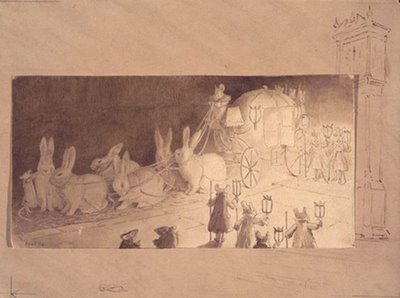 |
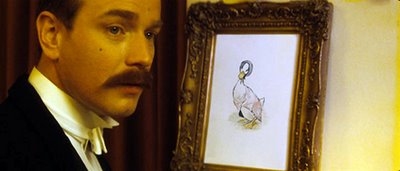 |
How much of a challenge was writing some of the music for this film for you?
The main challenge was to find simple ideas that resonate emotionally with the subject matter. With most of the scores I've written, this is almost always the hardest part - to say as much as possible with the least number of notes. |
The film is a visual journey for the viewer but how important do you feel the music has for the audience to get swept along?
Film music has the potential to illuminate deeper dimensions of the dramatic narrative & when it is working well it serves to draw the audience into the picture, engaging them on another level.
Of course the trick is to do this without the music being forced or manipulative.
Miss Potter is a film that traverses the hidden life of a woman who in many ways was ahead of her time & who paid little heed to the conventions & expectations of the period.
In the stifling environment of the Victorian era - when emotional expression was taboo & no one actually said what they were thinking, director Chris Noonan spoke frequently to me of the music engaging with the hidden emotional context of Beatrix's life & also supporting the subliminal subtext of Beatrix's journey through this deep & rich emotional landscape. |
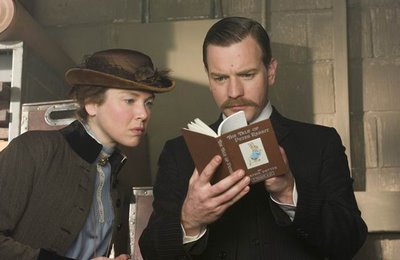 |
Where do you draw your inspiration when you are writing music?
The composer / director relationship becomes pivotal to the inspiration &
working process.
Good directors have a gut instinct for what works & what
doesnt & I frequently refer to them for guidance.
Chris Noonan & I developed
a solid working relationship on our first film together, "Babe", so
it was very
inspiring to have the opportunity to work with him again.
The editing & pacing of a film also has strong repercussions on the score, not to mention
the cast,
which in this case is second to none.
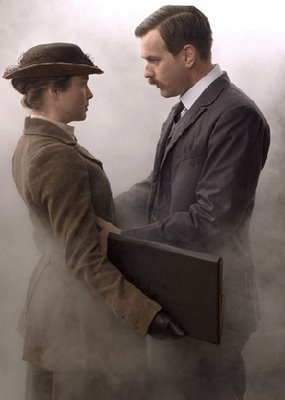 |
How different is it to write a musical score than to write a three minute pop song?
"Let me teach you how to dance" (the music box waltz from "Miss Potter") is about as close as I have ever come to writing a pop song. That tune came very quickly to me. The rest of the score took several months. Filmscores involve a lot of detailed work, carefully writing & fitting the music to the image & taking care with the orchestration.
What was it like collaborating with Mike Batt for the song When You Taught Me How to Dance?
It was a matter of taking the original music box melody that I wrote for Ewan McGregor & then re-adapting the lyrics & song for Katie Melua.
In a matter of minutes, Mike Batt cleverly turned the lyrics around to become the voice of Beatrix reminiscing on her affections for her first love, Norman Warne. Mike's rapport with Katie & his sensitive direction of her performance made him the ideal collaborator for this song. His musical sensibility is perfectly suited to film. We had a lot of fun that day.
Was this the first time you have worked with Mike?
Yes. I was familiar with Mike's work for television & his major music theatre piece "The Hunting of the Snark" which was introduced to me by my mother who performed in the orchestra (as a violinist) when Mike toured to Australia some years ago.
How did you feel about getting someone like Katie Melua to sing the song?
Katie has imbued the song with a very special blend of charm, whimsy, romance & spontaneity. She has made it her own. I cant imagine anyone else singing it. |
Which film score has proved an inspiration for you?
"The Red violin" by John Corigliano.
Is there any one musical writer who you would say is the top man or woman
for film score writing?
No.
And finally what is you first musical memory be it a record or song
or maybe it was someone singing?
And how did it effect you?
Both my parents were professional musicians so even before i was born I was
exposed to the sounds of my mother & father practicing music on a daily
basis. This had a profound effect on me & from as early as i can remember
I always wanted to play the clarinet just like my dad - which I did before turning
to music composition full time about 11 years ago.

back to articles and interviews





